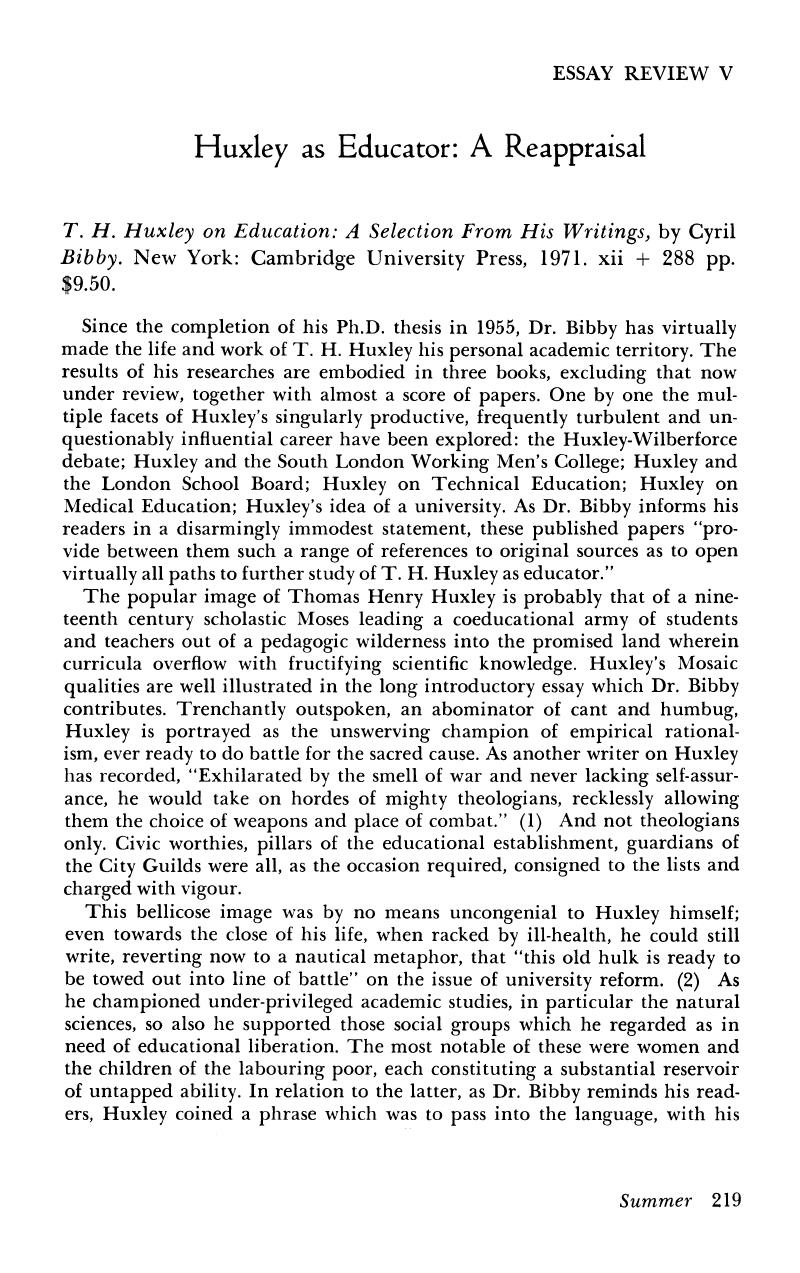Published online by Cambridge University Press: 24 February 2017

1. Eisen, Sydney, “Huxley and the Positivists,” Victorian Studies, 7 (1964): 399.Google Scholar
2. Huxley, L., Life and Letters of Thomas Henry Huxley (London, 1900), Vol. 2, 333.Google Scholar
3. Not 1909, as stated on p. 219 of the text.Google Scholar
4. Lovell, K., “Intellectual Growth and Understanding Science,” Studies in Science Education, 1 (1974): 15.Google Scholar
5. See e.g. Gardner, P. L., “Sex Differences in Achievements, Attitudes, and Personality of Science Students: A Review,” Science Education: Research 1974, Australian Science Education Research Association.Google Scholar
6. Council for Scientific Policy, Enquiry into the Flow of Candidates in Science and Technology into Higher Education (London, 1968), p. 35.Google Scholar
7. Science and Education. A policy statement issued by the Science Masters' Association and The Association of Women Science Teachers (1962), p. 5.Google Scholar
8. Young, Michael F. D., “Notes for a sociology of science education,” Studies in Science Education, 1 (1974): 58.Google Scholar
9. Huxley, T. H., Essays: Science and Education (London, 1893), preface, p.v.Google Scholar
10. For a more detailed account of both series of lectures see Layton, David, Science for the People (London, 1973) pp. 133–143.Google Scholar
11. Layton, David, “Science in General Education: the Rise and Fall of the First Movement, 1851–1857,” Journal of Educational Administration and History, 5 (1973): 7–20; and “The Educational Exhibition of 1854,” Journal of the Royal Society of Arts, 120 (1972): 183–87 and 253–56.Google Scholar
12. Hunt, R., “On Familiar Methods of Instruction in Science” in Lectures in connection with the Educational Exhibition of the Society of Arts (London, 1854) pp. 176–7.Google Scholar
13. Wilson, G. and Geikie, A., Memoir of Edward Forbes F.R.S. (London, 1861) p. 355.Google Scholar
14. Huxley, L., Life and Letters of Sir Joseph Dalton Hooker (London, 1918), Volume 1, p. 370.Google Scholar
15. de Solla Price, Derek J., “The Science of Science,” in The Science of Science, edited by Goldsmith, M. and Mackay, A. (London, 1966), p. 247.Google Scholar
16. Huxley, T. H., Introductory: Science Primers (London, 1889), p. 19.Google Scholar
17. Galileo puts the words into the mouth of Salviati during the third day of discussions on Two Principal Systems. Due Massimi Sistemi, iii (Opera vii), p. 355. English translation by Salusbury, T., Mathematical Collections and Transactions (London, 1661) p. 301.Google Scholar
18. Armstrong, H. E., On the need to humour Huxley's will (London, 1933). On p. 9 of the ‘Introductory Essay,’ Dr. Bibby quotes Armstrong's description of Huxley as a lecturer, but omits the critical passages: E.g., “We were hypnotised by his basilisk artistry into the absurd belief that we were learning: in fact, we were just being told, allowed to have no doubts, with no time to think!” Google Scholar